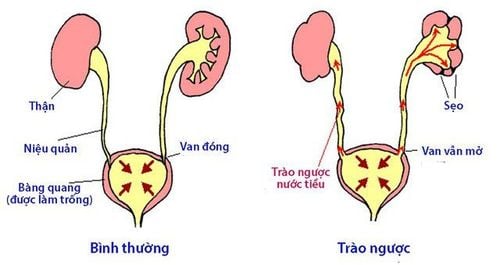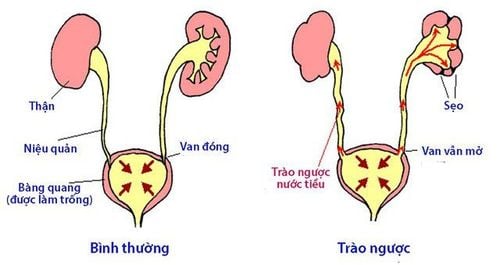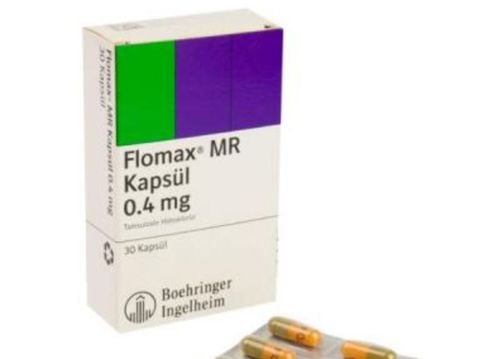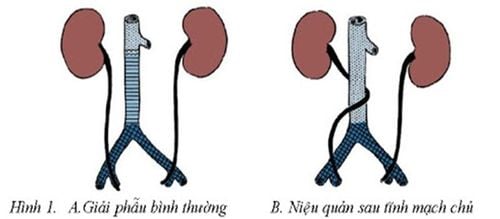This is an automatically translated article.
The article is professionally consulted by Master, Doctor Vo Thien Ngon - Department of General Surgery - Vinmec Da Nang International General Hospital
Vesicoureteral reflux disease is often diagnosed in infants and young children. The disease increases the risk of urinary tract infections, which can lead to kidney damage if not detected and treated promptly.
1. What is vesicoureteral reflux disease?
The urinary system consists of the following organs: kidneys, ureters, bladder and urethra. The kidneys are responsible for filtering blood, making urine, and urine travels through the ureters to the bladder and is stored here. The urethra is the passageway that expels urine from the bladder.Vesicoureteral reflux is a condition in which urine from the bladder flows back up into the ureter (the tube connecting the kidney and bladder). Normally, urine will not return to the ureter thanks to the pocket flap-type anti-reflux mechanism. Vesicoureteral reflux disease is often diagnosed in infants and young children. If not treated promptly, the disease can easily cause urinary tract infections and kidney damage.
People divide vesicoureteral reflux into 5 degrees based on bladder contrast film during urination. Specifically:
Grade 1: Reflux refers to the ureter; Grade 2: Reflux up to the renal calyx; Grade 3: Slight dilatation of the ureters, renal calyces, with sharp corners of the calyces; Grade 4: Moderately dilated ureter, renal calyx and loss of acute angle in renal calyx; Grade 5: Severe dilatation of the ureter (zigzag) and renal calyx, not clearly showing the image of the renal calyx.

2. Symptoms of vesicoureteral reflux disease
The feeling of needing to urinate a lot and for a long time; Painful urination, or holding back urine due to painful urination; Urinating many times, each time urinating a small amount; Blood in the urine or cloudy, strong-smelling urine; Fever; Pain in the back or abdomen; In infants, symptoms include fever, diarrhea, poor appetite, or fussiness; In older children, the disease can cause bedwetting, constipation, and kidney failure.3. Causes of vesicoureteral reflux
Causes of vesicoureteral reflux disease can be primary or secondary:Primary: The patient is born with a birth defect in the urinary tract, namely a lack of a valve that prevents urine from flowing. back from the bladder into the ureter. As the child grows, the ureter becomes longer and straighter, which can improve and solve the problem of urine reflux from the bladder to the ureter.
In addition, other congenital malformations such as: myasthenia gravis, ureteral malformation (wide ureteral foramen, ectopic ureter, ureteral reflux due to bulging ureter on the opposite side), bladder malformation Bladder (paraureteral bladder diverticulum, bladder paralysis) also causes vesicoureteral reflux.
Secondary: The bladder cannot empty urine, there is a blockage, muscle damage or damage to the nerves that control urination. Urine backs up in the bladder causing increased pressure and leading to reflux. The cause is because the patient has pathologies such as urinary tract infection, neurogenic bladder, lower urinary tract obstruction (posterior urethral valve, urethral stricture).

4. Factors that increase the risk of vesicoureteral reflux
In addition to the above causes, there are a number of factors that increase the risk of vesicoureteral reflux disease, including:Habits: Withholding urine, holding out a lot of bowel movements; Gender: Regarding congenital causes, boys are more likely to have vesicoureteral reflux than girls. However, in terms of overall morbidity, women are higher than men; Age: Infants and children under 2 years of age are more likely to have vesico-ureteral reflux disease than older children; Family history: People who have a father, mother, brother or sister with vesicoureteral reflux have a high risk of disease.
5. Measures to improve vesico-ureteral reflux
Currently, there is no method to prevent vesicoureteral reflux. However, parents can apply the following suggestions to improve their child's urinary tract:Give your child enough water to drink on the advice of a doctor; Let the child urinate regularly and clean from front to back; Change diapers early; Treat constipation if present. Parents should pay attention to observe the child, if the child has warning symptoms of vesicoureteral reflux disease, it is necessary to take the child to the doctor soon for an accurate diagnosis and a timely treatment plan, to reduce the risk of infection. urinary tract infection or other dangerous complications.
When parents see that their child has signs of vesicoureteral reflux, they can take the child to Vinmec International General Hospital for examination and treatment. There is a team of well-trained, professional and experienced gynecologists; system of modern equipment, meeting international standards; Professional service quality, helping the diagnosis and treatment process to be highly effective.
Doctor Vo Thien Ngon has over 7 years of experience working as a urologist and surgeon at Hospitals: Hue Central Hospital, Hue University of Medicine and Pharmacy Hospital, Tam Tri Da Nang General Hospital .
Doctor Ngon with the ability to specialize in the field of examination and treatment of diseases of the Urology and Andrology system, Urology surgery, endoscopic urological surgery, Laparo urinary tract surgery, endoscopy Urinary. Currently, Dr. Vo Thien Ngon is a Urology - Orthopedic Surgery Doctor, Department of General Surgery, Vinmec Da Nang International Hospital
Please dial HOTLINE for more information or register for an appointment HERE. Download MyVinmec app to make appointments faster and to manage your bookings easily.














